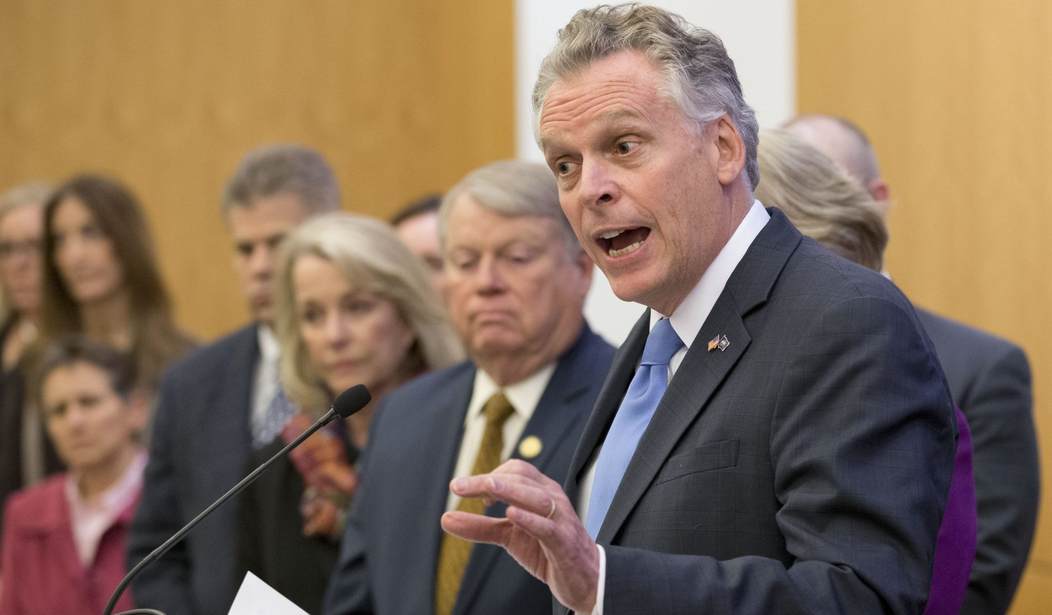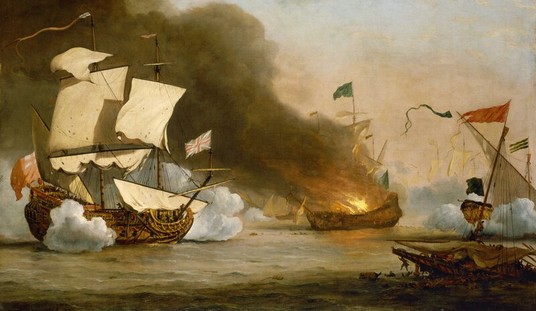Imagine the glee that political party leaders would feel in any state where they get the opportunity to sign up 206,000 new voters.
It’s happening in Virginia, and it is a gift from Democratic Gov. Terry McAuliffe.
His Virginia Democrats have mobilized all the usual suspects to sign up as many of these new voters as possible in time to vote for Hillary Clinton in November.
Virginia Republicans, on the other hand, have hired the highest-priced legal talent they could afford as the leadership of the Virginia House and Senate GOP prepares to fight McAuliffe’s April 22 order that allows more than 200,000 convicted felons to vote in November.
“The problem is with the violent offenders,” CBS-19 reported Del. Steven Landes (R) told an audience in Charlottesville, Va.
“We may have individuals coming out and having their rights restored, even though they have not paid their debts to society, which would be to the victims of their crimes, their serious crimes, or the courts costs and the like,” Landes added. “And that’s just not fair.”
Republican Party of Virginia Chairman John Whitbeck said the GOP doesn’t have a problem with allowing those who “have paid their debts to society” to vote.
“Mercy requires that we as Virginians be a Commonwealth of second chances. But there are limits,” Whitbeck said.
“Governor McAuliffe could easily have excluded those who have committed heinous acts of violence from this order, yet he chose not to,” Whitbeck said. “His decision to issue a blanket restoration, without regard to the nature of the crimes committed, doesn’t speak of mercy. Rather, it speaks of political opportunism.”
McAuliffe’s office argued his April 22nd order was not a blanket restoration of voting rights. They asserted the order included a “criteria-based restoration.” Virginia Department of Corrections officials then produced a list of people who were known to fit the governor’s criteria, totaling just over 206,000.
McAuliffe released a statistical analysis May 11 that he said proves 79 percent of the 200,000-plus felons that are going to be allowed to vote in November, assuming they register to vote, were nonviolent offenders who would have been allowed to vote, thanks to a previous executive order.
McAuliffe also said the numbers released by his office proved that Virginia’s previous policy of not letting felons vote “fell disproportionately on African-Americans.”
The study showed black Virginians accounted for 45.9 percent of the felons not allowed to vote, although the 2010 census data indicated that African-Americans compose just 19.4 percent of Virginia’s population.
House Speaker William Howell and Senate Majority Leader Thomas Norment believe that’s beside the point.
They’ve hired Charles J. Cooper — a founding member and chairman of Cooper & Kirk, PLLC, who was named by The National Law Journal as one of the ten best civil litigators in Washington — to challenge McAuliffe’s order restoring the civil rights of 206,000 convicted felons.
Norment said those who preceded McAuliffe and other attorneys general had concluded the governor does not have the power to issue a blanket restoration of civil rights.
“It is the obligation of the legislative and judicial branches to serve as a check on overreaches of executive power. To that end, we are prepared to uphold the Constitution of Virginia and the rule of law by challenging Governor McAuliffe’s order in court,” Howell said.
Beyond the constitutional question, Howell said he had no doubt about the timing or intent of McAuliffe’s order.
“The singular purpose of Terry McAuliffe’s governorship is to elect Hillary Clinton president of the United States,” Howell said in a statement in April. “The one-time nature of this action is proof positive of the governor’s political motivations. Instead of adopting a clear policy that can be applied equitably, he is changing the rules in the middle of the 2016 election to ensure Hillary Clinton’s victory.”
Democrat Del. David Toscano said other governors, from “Warner to Kaine to McDonnell,” thought it was a good thing to give people back their rights.
“McAuliffe has simply accelerated the process,” said Toscano.
The NAACP, the New Virginia Majority, and labor unions swung into action immediately after McAuliffe’s order to find those felons and sign them up to vote.
“People say it’s political. But for us, this is a moral issue and something that’s beyond any election cycle, beyond any candidate. It’s about giving a voice to a community that has felt voiceless,” said Tram Nguyen, co-executive director of New Virginia Majority.
So far, close to 2,000 felons, who have served their time, are newly registered to vote in the Commonwealth of Virginia.
“The governor’s action offers a stepping stone to empowerment,” Iman Shabazz, who described himself as a community organizer, told Richmond Justice.
One of those new voters is Phil Thomas, arrested nearly 20 years ago with $20 worth of crack in his car.
“It’s the worst mistake I made,” Thomas told the Washington Post while on a break from cutting grass at a public housing development on Richmond’s north side. “Because I’m getting old now, I’m realizing how important [voting] is.”
Thomas signed up to vote as soon as he found out about McAuliffe’s executive order, and plans to vote in November.
The last time Thomas voted in a presidential election, he cast his ballot for Bill Clinton.









Join the conversation as a VIP Member